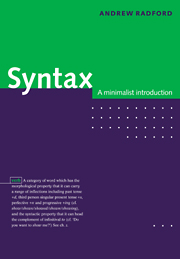6 - Operator movement
Published online by Cambridge University Press: 05 June 2012
Summary
In the previous chapter, we looked at the syntax of head movement. In this chapter, we look at a very different kind of movement operation, known as operator movement because it applies to expressions which contain an (e.g. interrogative or negative) operator of some kind.
So far, we have implicitly assumed that CP comprises a head C constituent (which is filled by a complementizer in some structures and by a preposed auxiliary in others) and an IP complement. However, one question which such an analysis begs is where the bold-printed preauxiliary constituents are positioned in structures such as (1) below:
(1) (a) What languages can you speak?
(b) No other colleague would I trust
Each of the sentences in (1) contains an inverted auxiliary (can/would) occupying the head C position of CP, preceded by a bold-printed phrase of some kind (viz. what languages and no other colleague). Each of the pre-auxiliary phrases contains a word which is sometimes classed as an operator: more precisely, what is an interrogative operator (or whoperator) and no is a negative operator. Expressions containing (e.g. interrogative or negative) operators are – for obvious reasons – called operator expressions (hence what languages and no other colleague in (I) are operator expressions).
It seems clear that each of the operator expressions in (1) functions as the complement of the verb at the end of the sentence.
Information
- Type
- Chapter
- Information
- SyntaxA Minimalist Introduction, pp. 130 - 150Publisher: Cambridge University PressPrint publication year: 1997
